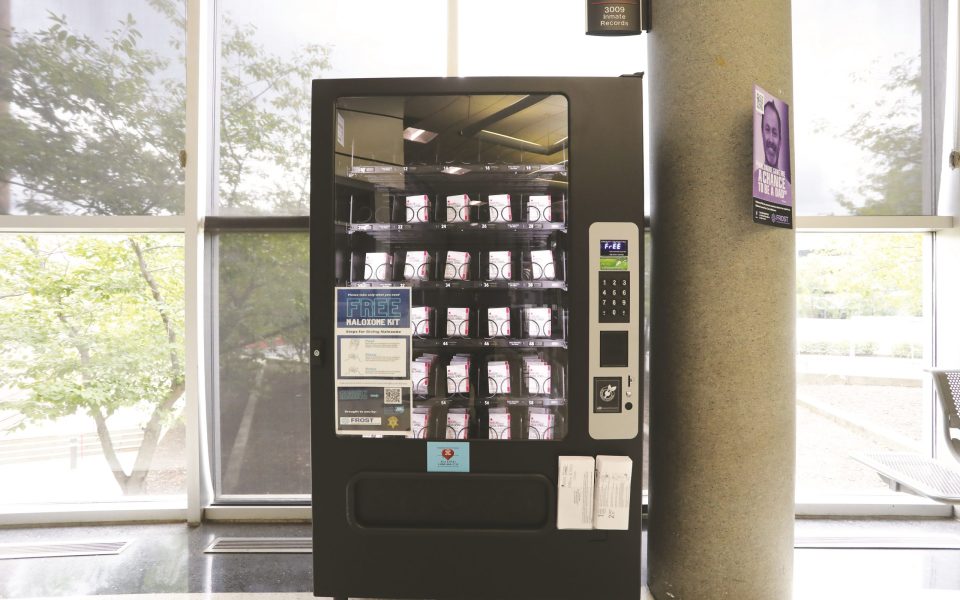Featured photo: The Naloxone machine in the Forsyth County Detention Center in downtown Winston-Salem. (photo by Jerry Cooper)
Correction (9/13/2022): The original version of this article stated that funds had already been allocated for a drug-checking program in Forsyth County. In fact, the county is still collecting feedback from the community and other stakeholders to decide whether opioid settlement funds would be used for such a program.
From afar, it looks like a regular vending machine — black, bulky with a front glass plane. This rectangular box that takes up space in the Forsyth County Detention Center is at first glance unassuming. Upon closer inspection however, passersby will notice that the identical white boxes that line the inside are not sugary and salty snacks.
On Aug. 25, in a partnership with the Forsyth County Sheriff’s Department, the Forsyth Regional Opioid and Substance Use Team, otherwise known as FROST, announced the placement of a Narcan/Naloxone vending machine in the front lobby of the Forsyth County Law Enforcement Detention Center. The move is part of a multi-pronged initiative by FROST to curb substance abuse in the county.
In 2021, there were 3,500 overdose deaths in the state, according to the North Carolina Department of Health and Human Services, 131 of them in Forsyth County. Through FROST, and with the help of $21 million from a multi-billion dollar national opioid settlement with three major pharmaceutical companies, Forsyth County is working to reframe its approach to the opioid epidemic.
FROST is a subset of the Forsyth County Department of Public Health, a group of representatives from various community agencies along with community members who have experience with and around substance use. Their primary goals are education, overdose prevention, harm reduction and the de-stigmatization of substance use. The group initially formed in 2017 under the name Forsyth County Opioid Task Force as a response to the increase in use and deaths from opioid use. Although prevention remained a top priority, “Task Force,” implied work predominantly by law enforcement, which highlighted only a small portion of the organization. Now, they’re expanding their efforts.
The naloxone vending machine, located in the lobby of the detention center in downtown Winston-Salem, is one example of their new approach.
Naloxone, often referred to as its brand name “Narcan,” is a medication designed to rapidly reverse opioid overdose. The kits included in the machine come at no cost, can be picked up anonymously and require no interaction with detention center employees. The front of the machine displays a flier with instructions on how to administer naloxone, as well as a QR code with access to community resources.

According to the Centers for Disease Control, multiple doses of naloxone may be required during a fentanyl overdose.
“Each box in the vending machine will contain two doses, if needed,” explains Amanda Clark, a substance use educator and FROST lead.
The National Institute of Health reports efficacy of overdose reversal following naloxone administration is between 75-100 percent.
FROST offers overdose awareness courses, as well as naloxone education for community members who are interested. Part of the organization’s expanded efforts includes broadening education about what drugs are in circulation.
A changing landscape
For many years, prevention efforts focused on opioids, but the organization is changing to keep up with the diverse and complicated landscape of substance abuse.
“FROST is a rebranding of the Forsyth County Opioid Task Force,” Clark explains. “The name change came because we wanted something that better represented the work we do, that made for inclusive and appropriate language. Our focus is wider than just opioids.”
Despite popular narratives, much of the intensifying opioid epidemic has been brought about by drugs that mimic opioid effects. Synthetic opioids, like fentanyl, are the most common drugs involved in overdose deaths in the United States. According to the National Institute of Health, of the 91,799 drug overdose deaths in 2020, 56,516 involved synthetic opioids — about 62 percent. Many of these are rapidly showing up in cocaine, methamphetamine, heroin and MDMA.
One of the primary objectives of FROST is to educate the public through enhanced access to drug-checking, a precursor in harm reduction and a way to increase understanding of Forsyth County’s drug-using residents.
Working in partnership with FROST, Twin City Harm Reduction Collective currently distributes fentanyl test strips that can help identify the presence of fentanyl in unregulated drugs prior to use. They do not, however, have the ability to check the amount of fentanyl in the drug, or notify the user if other substances are present. With a current grant opportunity, along with opioid settlement projects, FROST plans to start a drug-checking program to change that.
“Drug-checking is different from drug testing,” Clark explains. “Rather than testing an individual to see what drugs they have in their system, this is the actual process of checking drugs to see what’s in them. It’s a really great addition to the harm reduction work we are already doing here.”
A Fourier transform infrared spectrometer, or FTIR, can identify a sample in under a few minutes, including the dosage, components of the sample and levels of each component. The FTIR is able to identify an array of amphetamine and fentanyl analogues, as well as genetic variants of cannabis, cocaine and both human and veterinary tranquilizers.
Colin Miller, who co-founded Twin City Harm Reduction Collective and currently works with the UNC-Chapel Hill on drug checking research, helps run a FTIR at North Carolina Survivors Union in Greensboro. The union has been operating their FTIR for more than a year, serving members of the community who use drugs and those close to them. “We can test a cotton that someone used to filter,” Miller says. “We can use residue from a bag that looks empty. We can swab it and actually get enough to test it. It’s not like people are bringing in usable amounts of drugs, but people are able to make informed decisions about their drug use.”
“People have no idea what’s in their drugs these days,” Miller continues. “We are seeing tons of xylazine that causes all sorts of horrible skin conditions.”
Xylazine is used in veterinary medicine as a sedative and muscle relaxant. In human use, it can cause decreased responsiveness, slowed heart rate, low blood pressure, reduced breathing and, in some cases, skin ulcers and necrosis.
With increased education comes safer use, according to Miller.
“We’ve had people throw away their drugs on site when they found out certain things were in them,” he says of the Greensboro site. “We’ve had people shift their route of administration from injecting to snorting, to minimize the harm.”
In Miller’s observation based interventions, intravenous use of substances that contain xylazine is far more dangerous.
The FTIR allows both regular and infrequent drug users to make informed decisions about the drugs they test.
“With that FTIR, we can tell somebody within 10 or 15 minutes of them bringing in a sample, exactly what substances are in their drugs,” Miller says. “Therein, we can coach them on how to be most careful if they’re going to use it. It allows us to provide a whole new level of public health coaching.”

If approved by the county, funding for a drug checking program would come from the North Carolina Opioid Settlement Funds, which is a portion of the national settlement to remedy the nationwide impact of opioids. According to the Forsyth County government website, Forsyth County is expected to receive more than $20 million over the next 18 years. The NC General Assembly’s appropriation budget also includes explicit endorsements of purchasing equipment for drug checking.
Currently, the county is gathering input from the community and other stakeholders to present a report to the county commissioners who will make the ultimate decision of how to use the opioid settlement funds.
In addition to education, fighting the stigma of substance abuse is a huge push within the advocacy community. Part of that is putting the power back into the user’s hands.
“We want people using substances in Forsyth County to know that their county and their leaders care about them and want them to stay alive,” Clark says.
After about a week of the vending machine being in place, Clark said 89 Narcan kits have been taken.
Punitive drug policies, which have disproportionately affected people of color for decades, have proven to be ineffective in combating opioid usage and rising overdose numbers. In Forsyth County, FROST and other community partners hope this new multifaceted approach helps to curb overdoses through empathy and transparent education.
“The goal of FROST is to educate ourselves and educate our community regarding substance use and mental health,” she continues. “We want to de-stigmatize these things. We want to move our community in a direction where we can make some progress.”
Learn more about FROST at forsyth.nc.us/publichealth/frost.aspx or follow them on Facebook at facebook.com/forsythteam
Join the First Amendment Society, a membership that goes directly to funding TCB‘s newsroom.
We believe that reporting can save the world.
The TCB First Amendment Society recognizes the vital role of a free, unfettered press with a bundling of local experiences designed to build community, and unique engagements with our newsroom that will help you understand, and shape, local journalism’s critical role in uplifting the people in our cities.
All revenue goes directly into the newsroom as reporters’ salaries and freelance commissions.


Leave a Reply